

Most ebook files are in PDF format, so you can easily read them using various software such as Foxit Reader or directly on the Google Chrome browser.
Some ebook files are released by publishers in other formats such as .awz, .mobi, .epub, .fb2, etc. You may need to install specific software to read these formats on mobile/PC, such as Calibre.
Please read the tutorial at this link: https://ebookbell.com/faq
We offer FREE conversion to the popular formats you request; however, this may take some time. Therefore, right after payment, please email us, and we will try to provide the service as quickly as possible.
For some exceptional file formats or broken links (if any), please refrain from opening any disputes. Instead, email us first, and we will try to assist within a maximum of 6 hours.
EbookBell Team

4.3
78 reviewsA rare opportunity to delve into Japanese Marxist economics.
The West has a lot to learn from Japanese Marxist economics, which brings concepts like surplus value, class, the exploitation of labour and commodification to neoclassical economics. This classic work, following in the footsteps of Nobuo Okishio, Michio Morishima and Kozo Uno, provides a historical perspective on political economy and labour exploitation using extensive mathematical modelling.Suitable for students of economics, this is a new way to approach mainstream economics from a Marxist angle, and a a fresh perspective on historical materialism.
Hiroshi Onishi is Professor of Economics at Keio University in Japan, and a vice-chair of the World Association for Political Economy.
'The contribution of Japanese writers to the study of Marxist Political Economy remains underestimated in the Anglophone world … Among the important achievements of Japanese writers is the capacity to shed original light not only on the ‘pure economics’ of Marx’s thinking but on his Political Economy in the broadest sense. Hiroshi Onishi’s book is an invaluable addition to the canon which the late Makoto Itoh helped establish. It serves both as a textbook and as a historical introduction to the entire development of modern capitalist society from its pre-capitalist origins to the present day from a Historical Materialist perspective, which all scholars and researchers will welcome. An indispensable read.'- Alan Freeman, University of Manitoba